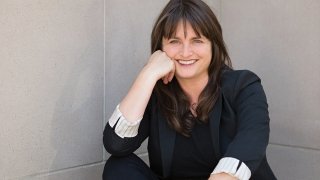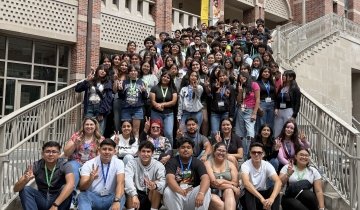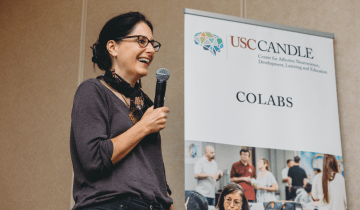Frequent flyer miles, customer loyalty benefits—reward programs work.
So why not use rewards to help first-generation students as they transition to college?
That’s the question USC Rossier Associate Research Professor Zoë Blumberg Corwin is exploring with Charge On!, a web-based incentive program she and her research team debuted last fall at California State University Dominguez Hills (CSUDH) in partnership with the nonprofit Get Schooled.
First-year students earn digital badges by completing online tasks—like watching a video about peer mentoring services, reading an article on scholarship opportunities or taking a quiz on remedies for a failing course grade. Badges yield reward points, which are redeemed for prizes.
A third of CSUDH first-year students joined the Charge On! campaign, and retention for this group was significantly better than the class average, which typically sees about 20 percent of students leave school before their second year.
Improving college access and success is Corwin’s passion. She directs the Digital Equity in Education project for the Pullias Center for Higher Education and has collaborated with USC game designers to build video games where teenagers fight aliens and, by osmosis, learn how to weigh decisions about choosing and affording the right college.
In another outside-the-box project funded by the Tony Hawk Foundation, Corwin is immersing herself in skateboarding culture, aggregating data that might be of interest to college recruiters and skateboarding nonprofits. Because skateboarding isn’t a recognized high school sport, these resilient risk-takers are largely overlooked in college admissions, she explains. As skateboarding joins the pantheon of Olympic sports in 2020, she expects things to change.
“That’s been my life’s work,” she says. “How do you create more equitable pathways to and through college?”
Working closely with Pullias Center founding director William G. Tierney, Corwin has been innovating in college access and success spaces in order to give underserved youths a leg up in the admissions process. Their approach was to steep students in “college knowledge” through gameplay.
Starting in 2011, the project rolled out a suite of strategy-building games in partnership with Tracy Fullerton and her Game Innovation Lab team, based in USC’s School of Cinematic Arts.
The first was a role-playing card game for three or four players. In Application Crunch, high schoolers must juggle academics, extracurriculars, part-time jobs and community service while competing for scholarships and college admission. The game has been used in hundreds of classrooms across the country and is now in its second printing.
Next came Mission: Admission, a web-based adaptation of the card game. More than 30,000 teens have engaged with it since 2015.
Also in 2015, the project team created Graduate Strike Force, a fantasy-based adventure game that helps players sort through financial-aid options and choose the right college for their needs and priorities.
A fourth game, Future Bound, was created that same year to get middle schoolers thinking ahead about choices that will impact college-readiness and career options down the road. To support classroom gameplay, teachers can download a modular curriculum created by Corwin’s team.
These projects were funded for more than $3 million by the USC Office of the Provost, the Bill & Melinda Gates Foundation, the Rosalinde and Arthur Gilbert Foundation, TG, and a grant from the U.S. Department of Education’s Institute for Education Sciences.
Corwin rates her own prior knowledge of game design and technology as “quite low,” but working with USC game designers, she quickly learned the ropes.
Rule No. 1, they told her: “It has to be fun and focused.” They also explained the game needs to resonate with the audience.
So Corwin and the game designers worked closely with students from James A. Foshay and Manual Arts high schools to create and test out the games to make sure they achieved their goals and held players’ interest.
But does in-game college knowledge translate to real-world action? To find out, Corwin and Tierney secured a $3.2 million U.S. Department of Education “First-in the-World Program” grant and thus launched the Mission: Admission Challenge in collaboration with Get Schooled. The effort has reached low-income students across 72 California high schools since 2015, boosted by a robust incentives program on the Get Schooled platform; for example, a celebrity principal-for-the-day contest brought Disney star Keke Palmer to the school with the highest 2016 participation rate.
The result: These 72 schools, compared with control groups, saw a 5 percent bump in FAFSA applications and a 4 percent uptick in college enrollments.
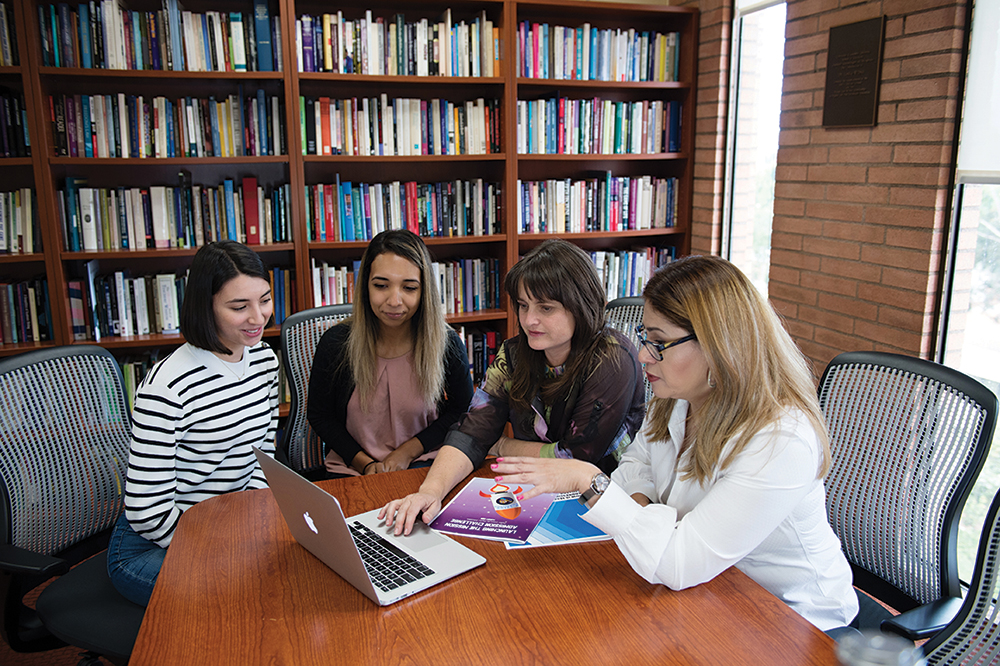
In 2018, Corwin's group received a $300,000 grant from the ECMC Foundation to adapt the Mission: Admission Challenge to help improve first-year persistence rates at CSUDH. About a third of the first-year cohort opted to engage with the web tools and texting platform. Early findings show improvements in that cohort’s GPAs, fall units completed and spring semester enrollment.
This type and scope of research connected to the projects is unprecedented in the college-access field: Corwin and her research partners have spent countless hours observing students playing their college-access games. They have conducted hundreds of post-game interviews, analyzed randomized controlled trial data to detect changes in California schools’ college outcomes and pored over reams of back-end data to parse in-game behavior.
Next up, Corwin hopes to work with Get Schooled to scale the project to high schools across the United States and dramatically increase its presence in postsecondary institutions.
To be sure, games aren’t a panacea for transmitting college knowledge, and gamified social-media incentives won’t tear down the significant systemic barriers low-income students face en route to college.
That said, “I love the fact that we can have an impact on schools,” Corwin says. “We are committed to working closely with practitioners and students, to being self critical and nimble enough to improve. That’s really exciting.”
College Locksmith
Growing up with a brilliant brother who struggled to learn in traditional school environments shaped Zoë Corwin’s worldview from an early age. So did her family’s immigrant experience.
Before Zoë Corwin was born, her South African parents left for England, repelled by their homeland’s apartheid regime. Her father, an engineer, settled the family in Creaton, a quaint British hamlet north of Cambridge. But Corwin’s younger brother had multiple learning disabilities, and local authorities were not supportive of his needs. So the family moved to Santa Barbara, Calif., when Corwin was 10. (Her brother went on to study medicine and earn a PhD in biophysics. Today, he conducts research on infectious diseases at UC San Francisco.)
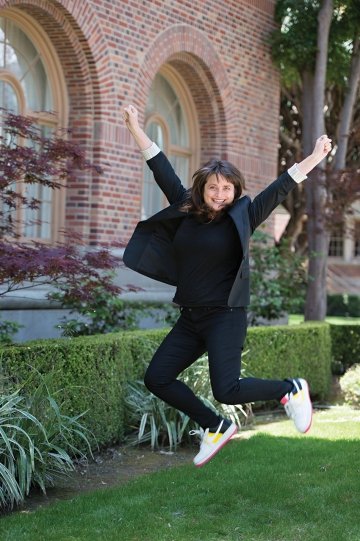
Corwin studied sociology at UCLA, and was recruited out of college to teach Spanish and global studies at the progressive Santa Barbara Middle School, where she had been a student a decade earlier. After four years, Corwin longed for a more diverse classroom.
With her husband, fellow educator Danny, she moved back to L.A. in 1998, and she started teaching Spanish at multiracial Pacific Palisades High. Almost immediately, she noticed an unsettling pattern: While her Spanish 1 classes were fully integrated, her honors and AP classes were filled exclusively by White and Asian kids.
“That didn’t sit well with me,” she says. “I felt compelled to go back to school and study issues of race, gender and equity, which is why I came to do my PhD at USC in sociology.”
She was mentored by William G. Tierney, Wilbur-Kieffer Professor of Higher Education in the USC Rossier School of Education, who brought her into the Pullias Center as a research assistant in 2001. She’s been there ever since.
Concern for inequities in access to high-quality educational opportunities is the central theme in all of Corwin’s work. With USC Rossier colleague Eugenia Mora Flores and two friends, she co-founded the social-justice themed New Los Angeles Charter Middle School in 2007. Located in midtown, the school expanded last year with an elementary-level campus in Baldwin Hills.
At USC, meanwhile, Corwin partnered with Professors George Sanchez and Wendy Smith as well as mentee and former foster youth Jasmine Torres ’14 to launch Trojan Guardian Scholars, a support program for USC students who have previously been in foster care. Among its signature achievements are on-campus housing and holiday dinners for students facing housing instability, including former homeless teens, wards of the court and emancipated minors.
Corwin’s dissertation focused on the university experiences of youth in foster care. Statistically, despite high college aspirations among the vast majority of youth with experiences in foster care, only 3 percent graduate from college. To better understand that data point, she followed six promising, college-bound foster youth through their senior year of high school and first year of higher education.
The results were “mixed,” she says. “They continued to move a lot. Lack of stability really plagued them.”
One of the most influential people in Corwin’s research circle is Jasmin Iraheta, a young woman who partnered with her on a yearlong study about college guidance, and whose world Corwin captured in a 2009 essay, “The Paper Trail of Lily Salazar.”
After earning her PhD, Corwin stayed on as a postdoc, and in 2013, she joined Rossier’s research faculty. Corwin has given more than 100 conference presentations, co-edited three books and co-authored 17 monographs and 23 journal articles.
She teaches a course on applied educational ethnography in USC Rossier’s PASA program. It’s the interaction with students, teachers, counselors and education policymakers—and translating the Pullias Center’s robust research findings into practitioner-friendly materials—that she finds truly exhilarating.
“I am so fortunate that the work I do is not confined to writing,” she says. “I bring my experience as a teacher and student-advocate to all facets of my role at USC.”
Explore More
TRY THE WHOLE SUITE OF USC ROSSIER COLLEGE-ACCESS GAMES
pullias.usc.edu/digitalequity/games-tools
REQUEST A SET OF APPLICATION CRUNCH
pullias@rossier.usc.edu
EXPLORE CHARGE ON!
getschooled.com/toroschargeon
DOWNLOAD OTHER PULLIAS CENTER RESOURCES
pullias.usc.edu/digitalequity/resources
SURF THE SKATEBOARDING STUDY
pullias.usc.edu/skate

